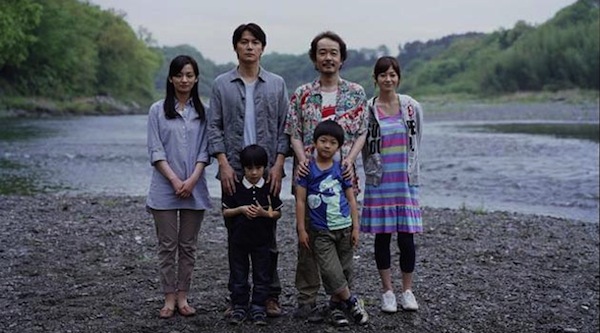You have no items in your cart. Want to get some nice things?
Go shoppingFollowing the beautiful I Wish, Koreeda Hirokazu once again proves himself an exceptional director of children in a tale where two sets of parents must deal with the revelation that their children have been mixed up at birth
Japanese director Koreeda Hirokazu has long been deemed an exceptional director of children, and a renowned purveyor of one of his country’s most beloved exports – delicate familial drama. Earlier this year, he returned to British cinemas with I Wish, a beautifully rendered and heart-warming tale of two brothers on either side of a divorce. He deftly explored the situation from a child’s point of view, eliciting fantastic performances from his pre-pubescent leads and pinning enormous grins to the faces of those that watched it. It was a joyous and moving drama even if it avoided the heavier themes beating below its surface.
Such deeper themes are very much the order of the day in Like Father, Like Son which would work as a perfect companion piece to I Wish. Switching the child’s-eye-view for that of the parents – in particular, the fathers – immediately places this on much more serious terrain than the magical bullet trains of I Wish, but through astute observations and assured direction he has crafted something no less playful or moving.
The father in question is Nonomiya Ryota, played excellently by Fukuyama Masaharu, a workaholic architect who lavishes more attention on professional projects than is given to family time. His endless toil pays for an expensive apartment in which he lives with his wife Midori (Ono Michiko), and their six-year-old son Keita (Ninomiya Keita). It also goes a long way towards his son’s impressive education, but when he passes the required exams to register for primary school, a blood test proves a revelation, that Keita is not Ryota and Midori’s son.
This opens up all manner of questions in Ryota about Keita’s nature, which he has often considered to be unlike his own, and the nature of blood ties is contemplated further when he encounters his biological son, Ryusei (Hwang Shôgen). Having been switched with Keita in the hospital at birth, he has been raised by the considerably less affluent Saiki family, owners of an electrical shop on the other side of town. As the families join together to enter a legal battle with the offending hospital, both sets of parents must confront the devastating position ahead of them and decide whether they should now make an exchange.
Where Ryota’s reservations about Keita’s nature were few, he must now come to terms with a son brought up in a way entirely alien to him. The Saiki family is bursting with love; Ryusei and his adopted siblings squeal with delight when their doting father enters the room. Where the Nonmiya family is neat, organised, and fairly stoic, the Saikis are shambolic and joyous; where Keita can play a piano duet with his father, Ryusei cannot hold chopsticks properly. He is Ryota’s natural-born son, however, and that is the cause for reflection not only on his own role as parent but on the nature of fatherhood itself.
As if ever the case with Koreeda, it’s handled with poignancy and a steady hand. The performances are all strong, with the filmmaker’s reputation for achieving great child performances once again proving a highlight. They remain so authentic and intuitive that you could watch the kids under his direction all day long. It is with the strength of these performances that Like Father, Like Son holds much of its power, along with Koreeda’s unobtrusive, but ever elegant and charming visuals.
Whilst never quite tear-jerking, it is a highly emotive journey that Ryota and Keita go on, handled with the tenderness that such subject matter requires. Laying bare the essence of what it means to be a father, for good and bad, and how a boy is as important to his dad, as the latter is to the former.
About Ben Nicholson
A compulsive cinephile, Ben fell in love with film through repeated viewings of Michael Jackson being transformed into a werewolf behind the scenes of John Landis' seminal video for Thriller. This passion has manifested itself in his consumption of movies and the enjoyment derived from reading, discussion and writing about cinema which can all be found on New Urbanite. His favourite films include The Third Man, In The Mood For Love, Badlands, 3 Iron, Casablanca, Ran, and Last Year in Marienbad - to name but a few.





